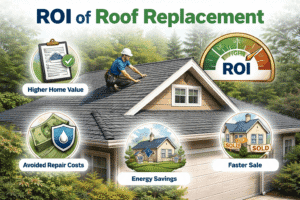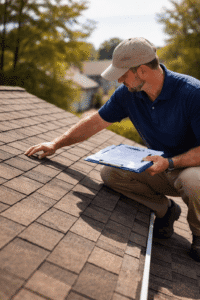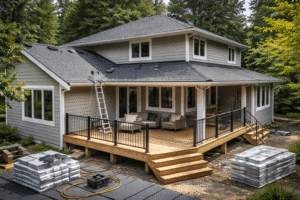When it’s time to replace your roof, one of the biggest decisions you’ll face is choosing the right material. The types of roofing materials available today are more diverse than ever, ranging from affordable asphalt shingles to premium tile, slate, and modern synthetic options. Each choice impacts your home’s durability, cost, and overall performance—especially in the Pacific Northwest, where heavy rain, moss growth, and seasonal temperature swings test a roof’s resilience.
In this guide, we’ll explore the different types of roofing materials, breaking down their pros, cons, and average lifespans. Whether you’re a Bellevue homeowner looking for a cost-effective solution or you want a high-end roof that boosts curb appeal for decades, understanding your options is the first step toward making a confident decision.
How Much Does a Roof Replacement Cost by Material?
When comparing the types of roofing materials, cost is one of the biggest factors homeowners consider. The national average for a roof replacement can vary widely, but local conditions—like Bellevue’s wet climate, labor rates in the Pacific Northwest, and material availability—play a big role in the final price.
Below is a quick cost comparison to give you an idea of what different roofing systems typically cost to install:
Average Roof Replacement Cost by Material (2025 Estimates)
• Asphalt Shingles: $5,000 – $12,000
• Metal Roofing: $12,000 – $30,000
• Tile Roofing (Clay or Concrete): $20,000 – $45,000+
• Wood Shingles/Shakes: $15,000 – $25,000
• Slate Roofing: $25,000 – $50,000+
• Synthetic/Composite Roofing: $15,000 – $30,000
💡 Keep in mind that these are ballpark ranges. Factors like roof size (in square feet), pitch, complexity, and tear-off/disposal fees all affect your final price.
👉 For a deeper breakdown of local pricing and what’s included in a professional estimate, check out our Roof Replacement Cost Guide
Asphalt Shingles – The Most Common Choice
When homeowners think about roofing, asphalt shingles are usually the first material that comes to mind—and for good reason. They’re the most widely used roofing material in the U.S., offering a balance of affordability, durability, and variety. If you’re comparing the different types of roofing materials, shingles often set the baseline for cost and performance.
Pros of Asphalt Shingles
• Affordable compared to tile, slate, or metal
• Easy and fast to install, keeping labor costs down
• Wide variety of styles and colors to match any home design
• Compatible with most roof shapes and slopes
Cons of Asphalt Shingles
• Shorter lifespan (typically 15–30 years, depending on quality)
• More prone to damage from wind uplift or algae in wet climates
• Requires more maintenance than premium materials like tile or metal
• Lifespan: standard asphalt shingles last around 15–30 years, depending on weather exposure, installation quality, and upkeep. Architectural shingles tend to last longer than basic 3-tab versions.
Types of Asphalt Shingles
• 3-Tab Shingles – The most economical option; flat and uniform.
• Architectural Shingles – Thicker, dimensional, and longer-lasting.
• Designer Shingles – Premium styles that mimic wood shakes or slate.
👉 Want to explore the top-performing shingle options on the market? Check out our blog on the Best Roof Shingles
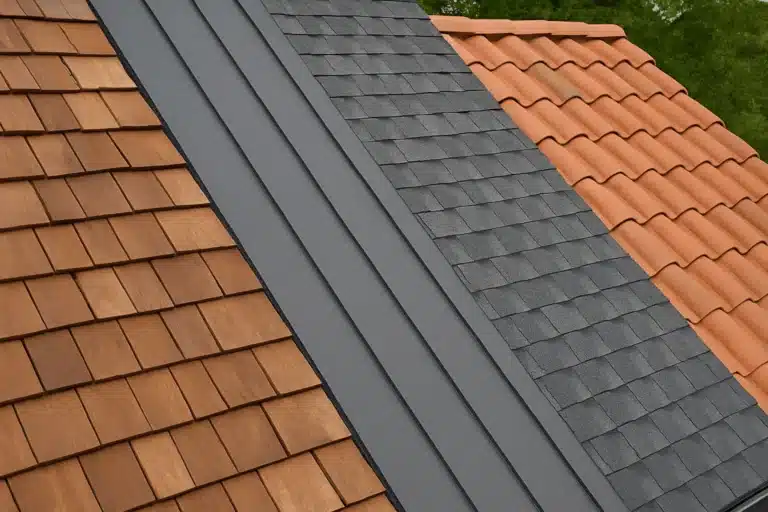
Metal Roofing – Durable and Long-Lasting
If you’re evaluating different types of roofing materials, metal roofing stands out as one of the most durable and eco-friendly options available. Known for its sleek appearance and incredible longevity, metal is a popular upgrade for homeowners in the Pacific Northwest who want a roof built to last.
Types of Metal Roofing
• Standing Seam Metal Roofing – Features vertical panels with raised seams for a clean, modern look and superior weather resistance.
• Metal Shingles – Designed to mimic traditional shingles, but with the added strength and longevity of metal.
Pros of Metal Roofing
• Exceptional lifespan of 40–70 years, often outlasting two or three asphalt shingle roofs.
• Energy-efficient, reflecting heat in the summer and insulating well in winter.
• Eco-friendly, as many metal roofing systems are recyclable and can even be installed over existing shingles to reduce waste.
• Low maintenance compared to traditional roofing.
Cons of Metal Roofing
• Higher upfront cost than asphalt shingles.
• Can be noisier during heavy rain or hail if not installed with proper insulation.
• Improper installation may lead to performance issues, so hiring an experienced contractor is critical.
👉 Thinking about upgrading to a long-lasting solution? Read our full guide on the Metal Roof Pros and Cons
Wood Shingles & Cedar Shakes – Rustic Appeal
When exploring the types of roofing materials available for Pacific Northwest homes, wood shingles and cedar shakes stand out for their natural, eco-friendly look. Their rustic charm pairs beautifully with many home designs in Bellevue, Seattle, and the greater Puget Sound region.
Pros of Wood Shingles & Cedar Shakes
• Attractive, natural appearance that enhances traditional or rustic-style homes.
• Eco-friendly, as wood is a renewable material.
• Provides decent insulation, helping regulate indoor temperatures.
• Lifespan of 20–40 years with proper maintenance.
Cons in Wet Climates Like Puget Sound
• Prone to moss, algae, and mildew growth, especially in damp, shaded areas.
• Require regular cleaning and maintenance to prevent rot or water damage.
• More expensive than asphalt shingles, both in material and upkeep.
Because of the wet climate in Bellevue and surrounding areas, many homeowners weigh wood shingles against other roofing materials like composition shingles.
Clay & Concrete Tile – Classic and Elegant
Among the types of roofing materials that stand the test of time, clay and concrete tiles are known for their classic look and exceptional durability. These roofs can last 50 to 100+ years when properly maintained, making them one of the longest-lasting roofing systems available for homes in Puget Sound.
Pros of Clay & Concrete Tile Roofs
• Fire-resistant and durable, providing excellent protection in a variety of climates.
• Energy-efficient, as the thermal mass of tile helps regulate indoor temperatures.
• Distinctive curb appeal that enhances both modern and traditional home designs.
Cons of Clay & Concrete Tile Roofs
• Heavy material that requires reinforced roof structures, making installation more complex.
• Higher upfront cost compared to asphalt shingles or even some metal options.
• Installation and repairs must be done by specialized professionals.
For Bellevue homeowners who want the timeless beauty of tile without the weight or fragility of clay and concrete, composite alternatives are an excellent option. 👉Explore Brava Roof Tile to learn how synthetic tiles mimic natural styles while offering lower maintenance and greater durability.
Slate Roofing – Premium, Natural Stone
When discussing the different types of roofing materials, slate stands out as one of the most luxurious and long-lasting options. Known for its natural stone beauty, slate roofing is considered a premium roofing system that adds unmatched elegance and value to a home.
Pros of Slate Roofing:
• Exceptional longevity and resistance to weather.
• Provides a luxury look that boosts curb appeal and home value.
• Naturally fire-resistant and eco-friendly, as it’s made from natural stone.
Cons of Slate Roofing:
• One of the most expensive roofing options on the market.
• Very heavy, often requiring extra structural reinforcement.
• Installation must be handled by highly skilled professionals.
For homeowners exploring high-end options, slate represents the pinnacle of quality. 👉 Learn more about Premium Roofing Systems to see how slate compares with other advanced materials designed to last for decades.
Synthetic & Composite Roofing – Modern Alternatives
Among the many types of roofing materials, synthetic and composite roofing has become a favorite for Puget Sound homeowners who want the look of slate or cedar shakes without the weight or high cost. Options like rubber slate and composite tiles (including Brava Roof Tile) provide durability and style while being more sustainable than traditional materials.
Pros of Synthetic & Composite Roofing:
• Lightweight, making it easier to install on most home structures.
• Long-lasting, with lifespans of 40–50+ years depending on the brand.
• Eco-friendly, since many products are made from recycled materials.
• Available in a wide variety of colors and styles, mimicking slate, clay, or cedar without the maintenance.
Cons of Synthetic & Composite Roofing:
• Higher upfront cost compared to asphalt shingles.
• Limited availability of certain premium brands, which may require a certified contractor for installation.
For homeowners focused on sustainability and performance, synthetic and composite roofing offers an excellent balance of beauty and durability. 👉 Explore our guide to Eco-Friendly Roofing Options to see how modern materials can protect your home while reducing environmental impact.
Green & Solar Roofs – The Future of Roofing
As homeowners explore different types of roofing materials, many are looking ahead to eco-conscious solutions. Green and solar roofing systems are transforming how we think about the role of a roof—not just as protection, but as a source of energy savings and sustainability.
Living Roofs (Green Roofs):
• Provide natural insulation, lowering heating and cooling costs.
• Improve stormwater management and reduce runoff.
• Enhance curb appeal while supporting biodiversity.
Solar Shingles & Panels:
• Generate clean electricity directly from your roof.
• Reduce reliance on utility companies and protect against rising energy costs.
• Can increase your property’s resale value.
Pros:
• Significant energy savings and reduced carbon footprint.
• Modern, innovative look that aligns with sustainability goals.
Cons:
• Higher upfront installation costs.
• May require additional maintenance or monitoring compared to traditional materials.
Green and solar roofs aren’t for every home, but for eco-conscious homeowners in the Pacific Northwest, they offer a powerful way to combine function with sustainability.
👉 Learn more about the Pros and Cons of Solar Panels to see if this option is right for you.
Roofing Materials Comparison – Which Is Right for You?
After reviewing the different types of roofing materials, the best choice ultimately depends on your budget, your home’s style, and the local climate. Here’s a quick comparison to help guide your decision:
• Asphalt shingles → Most affordable, lifespan of 15–30 years, ideal for budget-conscious homeowners.
• Metal roofing → Higher upfront cost but 40–70 years of durability and energy efficiency.
• Wood shingles/cedar shakes → Rustic and natural appeal, 20–40 year lifespan, but more upkeep in wet climates.
• Clay & concrete tile → Elegant look with 50–100+ year durability, though heavy and costly.
• Slate roofing → Premium natural stone, can last over a century, but expensive and heavy.
• Synthetic/composite → Lightweight, eco-friendly, 30–50 year lifespan, strong ROI.
• Green & solar roofing → Sustainable and energy-saving, but require higher upfront investment.
Final Thoughts – Choosing the Best Roofing Material in Puget Sound
There’s no one-size-fits-all answer when it comes to the best roofing material. The right choice depends on how long you plan to stay in your home, your budget, your style preferences, and how well the material performs in the Pacific Northwest climate.
If you’re unsure, the safest next step is to speak with a trusted local contractor who understands Bellevue and Puget Sound’s unique weather challenges.
👉 Contact Orca Roofing & Exteriors for a free roof inspection and material consultation today. Our in-house experts will help you evaluate options, compare costs, and choose a roofing system that protects your home for decades.
FAQs About Types of Roofing Materials
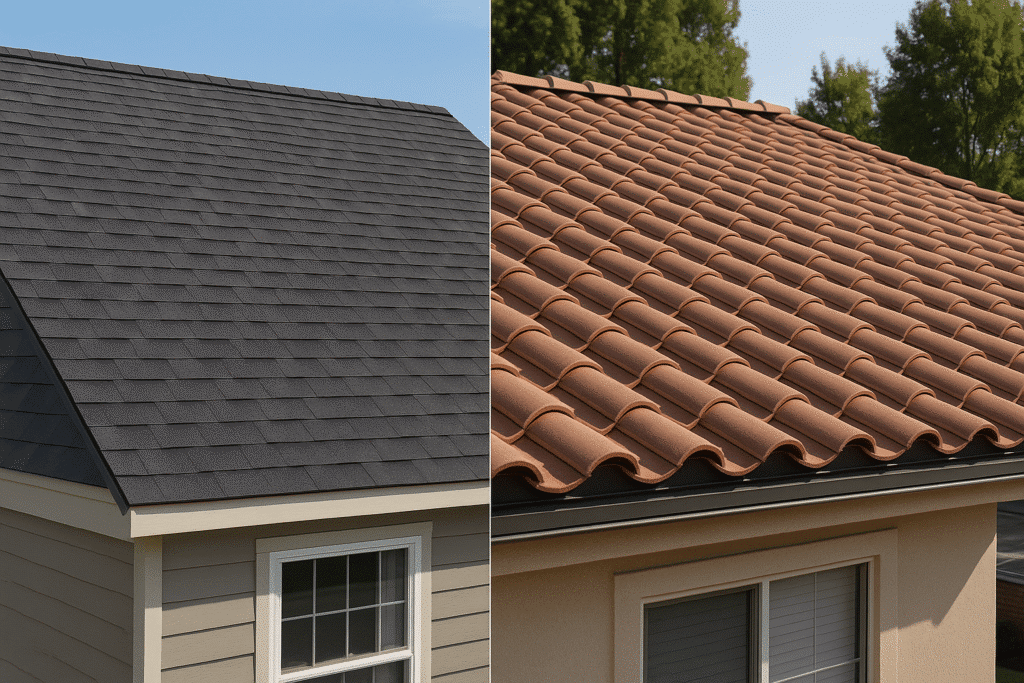
What are the different types of roofing materials?
The most common types of roofing materials include asphalt shingles, metal roofing, tile (clay or concrete), slate, wood shingles and shakes, and synthetic/composite options. Some homeowners are also exploring green roofs and solar shingles for added sustainability. Each material varies in cost, durability, and appearance.
What is the best material to use for roofing?
It depends on your goals. Asphalt shingles are the most popular because they balance affordability with durability. If longevity is your priority, slate and metal roofing can last 50–100 years but require a higher upfront investment. Brava Tile roofing is another excellent option for both durability and curb appeal.
What is the most commonly used type of roofing material?
Asphalt shingles are the most commonly used roofing material in the U.S. They’re affordable, quick to install, and designed to withstand a wide range of weather conditions—making them a go-to choice for homeowners across the Pacific Northwest.
Which roof is the easiest to install?
Metal roofing is considered one of the easiest and fastest to install, especially standing seam panels. Asphalt shingles are also relatively simple to install, which contributes to their popularity. Both are great choices for homeowners who want efficient installation without compromising on quality.
How do I know if I need a new roof?
Look for warning signs like curling, cracked, or missing shingles, excessive granules in gutters, persistent leaks, or a roof that’s over 20–25 years old. If you’re noticing these issues, it’s time to consider a replacement.
